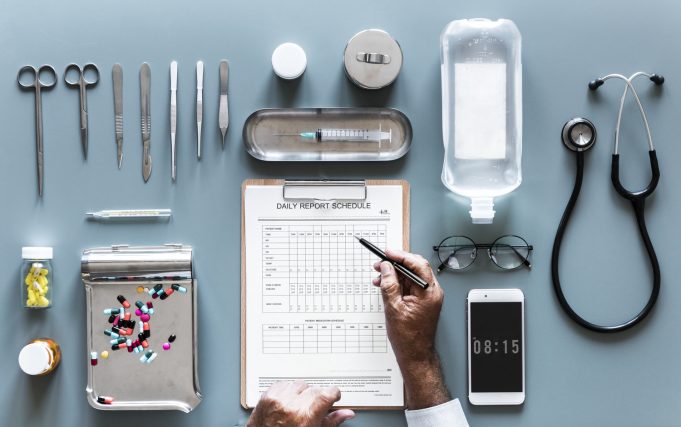Pharmacy technician jobs are to grow an expected 12% over the next decade, which is much faster than the average of 7%. These professionals play a key role in the pharmaceutical industry.
They work with pharmacists to prepare and distribute medications in various medical settings.
These medical professionals must have extensive training to work as a pharmacy technician.
Are you curious about pursuing a career as a pharmacy technician? You’ll need to know what you’re getting into before you start your training.
Here’s all you need to know about becoming a pharmacy tech training and how to get started.

What Pharmacy Technicians Do
A pharmacy tech may work in a variety of different medical settings. They may work in big-box retail pharmacies, chain pharmacies, hospitals, clinics, and more.
As a pharmacy tech, you’ll be responsible for the following:
- receiving and ensuring the accuracy of incoming prescriptions
- preparing medications for patients
- performing calculations for prescriptions
- performing administrative duties for the pharmacy
- managing accurate patient information
- preparing and packaging mail-order prescriptions
Depending on the state in which you choose to work, some of the duties and responsibilities may vary.

This blog can help you discover the role pharmacy techs play in the medical field.
Working as a pharmacy tech can be an incredibly rewarding and exciting experience. Pharmacy techs are in high demand as medical and pharmaceutical industries expand.
Pharmacy Tech Training Overview
Pharmacy technicians perform many important duties to make sure patients receive proper treatment. Most pharmacy technicians will undergo a one-year certificate program or a two-year degree program.
Both of these typically involve a focus on pharmacy technician studies. The programs may also include a variety of courses in the liberal arts, such as psychology and communications.
The additional training in humanities may help you along the way in a real-world pharmacy setting.
Pharmacy techs need to have a strong ability to communicate. Technicians interact all day with patients who need advice on medications.

Techs need to be able to give instructions and answer any potential questions a patient may have.
Some of the important coursework you may take include the following:
- Inventory
- Pharmacy Math
- Anatomy and Physiology
- Pharmacy Law
- Pharmacy Ethics
- Laboratory Skills
- CPR and First Aid
- Chemistry
- Pharmacology
In most states, you’ll need to have a formal certification before you can begin working as a pharmacy technician. In some cases, you may be able to forego formal education and get your training on-the-job.
In either case, on-the-job training will be a vital part of your overall tech training.

On-the-Job Training
The training you receive in a real-world pharmacy will provide you with practical skills. These skills will help you thrive in the pharmaceutical industry. You can find some on-the-job training programs in retail pharmacies.
These programs will often have the support of the Pharmacy Technician Certification Board (PTCB). Although these programs are on-the-job, you will still need to spend some time in a classroom or taking online courses.
Depending on the state, you will need to complete certain courses regarding the legal aspects of the job. These courses will often take place online.
You’ll learn about the Health Insurance Portability and Accountability Act of 1996 (HIPAA). This will help you understand how you must handle patient information on a day-to-day basis.

You’ll learn how to properly transcribe prescriptions.
Once you complete your training, you’ll be able to practice in a practical setting. You’ll start with shadowing a more experienced technician who will explain what there is to know about the job.
You’ll learn all aspects of the job, from pick-up and drop-off to filling prescriptions to administrative duties.
Associate’s Degree Programs
You can get pharmacy technician training from an accredited college or associate’s degree program. These programs will cover all the technical and scientific aspects of the training.
You may complete these programs in as little as two years.
In addition to industry-specific training, you’ll have access to science and humanities courses. This provides you with a more comprehensive and well-rounded training program.

Certification Exams
Regardless of the path you choose, you’ll need to get certified. Your education and practical experience should aim to prepare you for certification exams.
To get a national certification as a pharmacy technician, you’ll need to pass the PTCB exam.
In your search for a training program, you should consider whether or not it will prepare you for the exam.
Thinking in the Long-Term
Before you decide which route to take with your technician training, you should consider your long-term career goals. Different types of pharmacies may require different levels of experience and certification.
For example, hospital pharmacies often require 3-5 years of practical experience. You may wish to seek out a training program in a hospital pharmacy.
If you wish to explore the opportunities as a pharmacy technician, you may wish to seek out an associate’s or even a bachelor’s degree.

This will give you the background to move up as you progress through your career. For example, some technicians have opportunities to work in specialties, such as oncology.
Some pharmacy techs even go on to seek out a career as a pharmacist. With a bachelor’s degree under your belt, you’ll be that much closer to becoming a pharmacist.
Keep in mind pharmacists must undergo at least four years of education after their bachelor’s degree. This includes coursework in dosage, medication interactions, and more.
They then need to complete a two-year residency program and receive licensure.
Jump start Your Medical Career
Working in a pharmacy can be fun and rewarding. You’ll gain practical experience in addition to formal education.
This can open up many doors for you in your career.

Don’t be afraid to take a leap of faith and invest in pharmacy tech training. No one path is right for everyone. Pharmacy technicians have options when it comes to training programs.
Are you curious about how you can advance your career in the medical or pharmaceutical industry? Check out this article about the pharmaceutical business.









